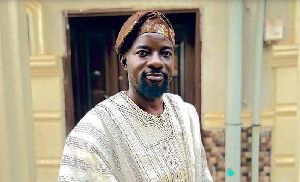By Larry-Alans Dogbey
In the wake of four lawyers- Dr. Raymond Atuguba, Larry Bimi, David Annan,
and Abraham Amaliba- being dragged before the Legal Council by the Judges
and Magistrate Association, to substantiate their assertion that the
judiciary was corrupt, a retired Supreme Court Judge, Justice Francis Yao
Kpegah, has admonished the judiciary to leave the lawyers alone.
Speaking to The Herald in an exclusive interview, Justice Kpegah said the
claims by the lawyers were nothing new, and that it would have been better
if the Judges and Magistrates Association of Ghana had ignored the comments
made by the lawyers, and rather go into self-introspection.
According to him, Chief Justices like the late Justice George Kingsley
Acquah and the sitting Chief Justice, Justice Georgina Theodora Wood, have
over the years had admitted that the judiciary was corrupt and rotten.
Justice Kpegah, an ex-acting Chief Justice, recalled how prior to the demise
of Chief Justice Acquah, there a sensational publication in the Daily
Graphic newspaper, in which he said that judges were not writing their
judgments, and that other people were doing so for them.
Mrs. Justice Henrietta Abban and the late Justice Stephen Tawiah Faakye were
both accused of taking orders from the Castle to have Messrs Dan Abodakpi
and Tsatsu Tsikata jailed. Indeed Tsatsu who was before Mrs. Justice Abban
was jailed while Justice Faakye convicted and jailed Abodakpi who was before
him.
Mr. Justice Kpegah also recalled how before becoming the head of the
judiciary, Justice Acquah chaired a committee which toured the country
investigating corruption in the judiciary, and submitted a report on it to
Parliament, adding that a complaints unit was subsequently established by
the late judge for people to report such cases but very little came out of
its work because the officer put in-charge was of a lower rank, and could,
therefore, not confront the senior judges.
He noted further that the current Chief Justice has also publicly admitted
that the judiciary was corrupt.
Justice Kpegah cited an instance where a senior judge once rang a colleague
who was sitting on a case involving a relative of shipping magnate, Alhaji
Asuma Banda, to alert him of an influential man in the Ghanaian society, who
was interested in having Alhaji Banda’s relative jailed.
That judge was said to have refused to yield to the pressure to jail Alhaji
Banda’s relative, and insisted on deciding the matter on its merit. For this
reason, the judge who was due for promotion to the Supreme Court was denied
that right.
He also mentioned Transparency International (TI) as indicating in one of
their reports, how a percentage of the Ghanaian society perceived the
judiciary as corrupt.
“We have all admitted it and advised them to stop the corruption that is
dragging our name in the mud”, Justice Kpegah underscored, adding that,
“they should accept the criticism in good faith because that is the only way
by which the judiciary can be cured of this canker.”
He noted that it was not only the judges and the magistrates who were
corrupt, but other workers in the judiciary, such as officers of the courts,
were equally perceived of the same crime.
The Judges and Magistrates Association has filed official complaints at the
General Legal Council against the four lawyers, demanding that they appear
before it and substantiate their claims that the judiciary is corrupt.
The four lawyers were said to have made comments to the effect that the
judiciary was corrupt, at a round-table discussion on the Judiciary and
Ghana’s justice system, in Accra. The event was organised by the National
Commission for Civic Education as part of its annual constitution week
celebrations.
Dr Atuguba said at the meeting that he could not be convinced that there was
no corruption in the judiciary in Ghana.
“Aside political interferences and what the chairman referred to as
telephone justice, we also know about interferences from the private sector
– private businesses and private individuals – and I have done several cases
where the client will tell me, ‘lawyer let’s go and see the judge’ and when
I say no, then they are surprised and I’m almost certain that some of them
went behind me and saw the judges because of what happened in court
afterwards and the fact that they never mentioned the issue again after I
said no.
They just silently went back, paid the bribe and then you realise suddenly
as the lawyer that the case is moving very fast and in the end you win. So
these are real things that make it difficult for you to oppose when you hear
somebody saying that the system is corrupt,” he stated.
Dr. Atuguba who is the Executive Secretary of the Constitution Review
Commission, cited instances where bribes meant for one judge were mistakenly
brought to a house where he lived, and when he helped a judge he described
as upright, to return some bribes.
Dr. Amaliba agreed with Dr. Atuguba’s submission, stressing that “judicial
corruption in Ghana is no longer a perception but a reality – the Chief
Justice has alluded to this, judges themselves have also alluded to this.”
“There is a perception which has gained currency that without a bribe, you
cannot secure a favourable decision in court,” he added.
The NCCE Chairman, Mr Larry Bimi and David Annan of the NDC legal team are
said to have made similar comments published in various newspapers. But the
judges insist those who allege that judges are corrupt must provide proof.
The statement issued by the judges said, “For a considerable period of time
now, members of the judiciary have become increasingly disturbed by the
growing spate of unsubstantiated allegations made against the judiciary, in
general, by various legal practitioners.”
General News of Saturday, 21 May 2011
Source: The Herald
Justice Kpegah Tells Judges Not To Bully The Laywers
Entertainment











